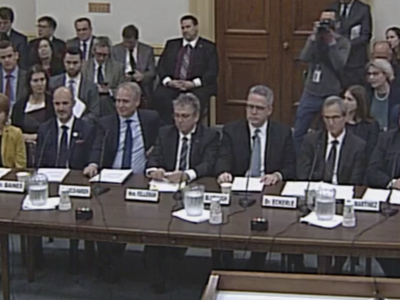Federal Climate Policy
Toyota’s Defense of Its Choice to Support the Trump Administration’s Auto Standards Rollback Rings Hollow
Sadly, Toyota Has Ceded Its Place As the Industry’s Environmental Leader
My colleagues Ann, Cara, Julia, and Rick have all written about various aspects of the decision by General Motors, Toyota, and other automobile manufacturers to side with the Trump administration as it tries to prevent California from setting its own greenhouse gas emission standards. The administration is implementing this rollback in tandem with a federal …
CONTINUE READINGLooking Into USDOJ’s Lawsuit To Dismantle the California-Quebec Greenhouse Gas Cap-and-Trade Linkage Program
While DOJ Says It “Didn’t Consult With The White House,” There Are Clues the Case Is Politically-Motivated
My colleagues Ann Carlson and Cara Horowitz wrote last week about the Trump administration Department of Justice’s lawsuit against the California Air Resources Board, the Western Climate Initiative, and various California-based officials of both, claiming California is unlawfully trying to engage in foreign policy through its greenhouse gas cap-and-trade program’s linkage with Quebec. There appear …
CONTINUE READINGLet’s Get One Thing Straight
The waiver preemption lawsuit isn’t about one national fuel economy standard.
As Ann wrote yesterday, the Association of Global Automakers and the auto companies General Motors, Toyota, and Fiat Chrysler have stated their intent to intervene in pending litigation challenging the Trump administration’s rule to preempt California’s Advanced Clean Cars program, and any future tailpipe greenhouse gas (GHG) emissions standards the state and others might seek …
Continue reading “Let’s Get One Thing Straight”
CONTINUE READINGGeneral Motors Can’t Have It Both Ways
Several media outlets are reporting that General Motors, Toyota, and Fiat Chrysler are intervening on the side of the Trump Administration in California’s lawsuit challenging the federal government’s yanking of the state’s permission to issue its own tailpipe standards for greenhouse gases and to require zero emissions vehicles. (Cara described the lawsuit here. Julia and …
Continue reading “General Motors Can’t Have It Both Ways”
CONTINUE READINGHow Can We Achieve a Carbon-Neutral Transportation Sector by 2050?
Developments from a hearing before the House Subcommittee on Environment and Climate Change
Today, the Subcommittee on Environment and Climate Change of the House Committee on Energy and Commerce held a hearing entitled “Building a 100 Percent Clean Economy: Solutions For Planes, Trains and Everything Beyond Automobiles.” As the title suggests, the Subcommittee’s hearing sought to probe opportunities to decarbonize the transportation sector while focusing on modes of …
Continue reading “How Can We Achieve a Carbon-Neutral Transportation Sector by 2050?”
CONTINUE READING2020 in the Courts: A Preview
Some major new cases will be filed; older ones will result in major decisions.
There are going to be some significant environmental cases over the next year. In addition, some important new cases will be filed now or in the near future, which may have produced some interesting rulings. It will probably take more than a year, however, for some of the big new cases down the turnpike to …
Continue reading “2020 in the Courts: A Preview”
CONTINUE READINGGoing Nuclear?
Nuclear has some serious problems, but it may be worth hedging our technology bets.
Nuclear power has been an important source of zero-carbon energy, though it has been plagued by other problems. Does it have a future in our effort to decarbonize the grid? According to the Union of Concerned Scientists (UCS), a third of U.S. nuclear plants, or about twenty percent of the nation’s total nuclear capacity, are …
Continue reading “Going Nuclear?”
CONTINUE READINGWhy are automakers fighting Trump’s emissions rollback?
The answer may lie in the electric vehicle investments the industry is busy making
As we move ever deeper into an all-out legal war between California and the Trump Administration over rollbacks of automobile emissions standards (something Ann, Cara, and Julia have been covering very well), I want to explore in a little more depth why the automakers have been so resistant to Trump’s rollback efforts. The auto industry …
Continue reading “Why are automakers fighting Trump’s emissions rollback?”
CONTINUE READINGWelcome to the Next Phase of the Great California-Trump Car Wars
First lawsuit filed, more to come
California didn’t wait long to file its first court challenge to the rules just finalized by the Trump Administration related to California’s GHG and ZEV car emissions standards (discussed here and here by Julia and Ann). Here’s the complaint filed by California together with 23 other states, along with the cities of LA and NY. …
Continue reading “Welcome to the Next Phase of the Great California-Trump Car Wars”
CONTINUE READINGEPA/Transportation Announcement of California Waiver Revocation is Full of Falsehoods and Irony
How Many Misstatements Can You Find?
This morning, the Environmental Protection Agency and Department of Transportation formally announced — as expected — that the Trump Administration is revoking California’s waiver to set its own vehicle standards. Yesterday, Trump tweeted the news, coupling it with falsehoods claiming that the rollback would save lives and save consumers money. As I blogged yesterday, both …
CONTINUE READING





